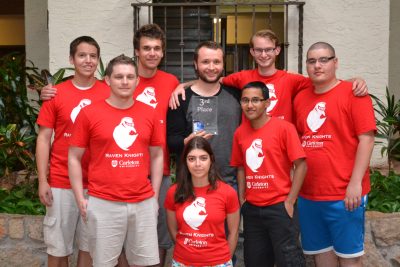
The Raven Knights, a group of students representing Carleton University, ranked third in the 2015 CanSat competition; world’s largest and most prestigious space-related undergraduate competition. This annual design-build-launch competition, organized by the American Astronautical Society (AAS) and American Institute of Aeronautics and Astronautics (AIAA), challenges students to design and assemble a space-like system over eight months and then compete against each other during a rocket launch demonstration held in Burkett, Texas.
Sponsored by NASA and the Naval Research Laboratory, this year’s competition was simulating a science vehicle traveling through a planetary atmosphere sampling the atmospheric composition during descent. In this context, the teams had to design a vehicle and its re-entry container which protects the vehicle during the initial rocket deployment phase. Teams were judged on the amount and quality of data collected during the descent flight, as well as their ability to safely return the vehicle back to the ground. The Carleton’s Raven Knights were awarded a score of 95.19 per cent, raking them third among 59 international teams. Carleton was one of the three teams representing Canada in this competition.
Carleton’s multidisciplinary team from the Department of Mechanical and Aerospace Engineering and the Department of Electrical and Computer Engineering, consisted of Graham Blackport, Bradley Kuiack, John Goldnau-Vogt, Erik Johnson, Maytham Sabbagh, Kyle Conway, Alok Deshpande, Giuliana Velarde, Aman Sunesara, and Akshay Puli. Bradley Kuiack is currently working as a NSERC Undergraduate Research Assistant in the Spacecraft Robotics and Control Laboratory. Carleton’s CanSat team was supervised by Professor Steve Ulrich, from the Department of Mechanical and Aerospace Engineering.